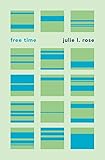Free Time / Julie Rose.
Material type: TextPublisher: Princeton, NJ : Princeton University Press, [2016]Copyright date: ©2017Description: 1 online resource (184 p.)Content type:
TextPublisher: Princeton, NJ : Princeton University Press, [2016]Copyright date: ©2017Description: 1 online resource (184 p.)Content type: - 9780691163451
- 9781400883684
- Leisure
- POLITICAL SCIENCE / History & Theory
- Sunday closing laws
- United States
- basic needs
- caregivers
- caregiving
- contemplation
- distributive justice
- economic growth
- effective freedoms
- egalitarian justice
- employment
- free choice
- free time
- freedom of association
- gender justice
- gender
- household responsibilities
- income
- inequality
- just society
- labor demand
- labor regulations
- leisure
- liberal egalitarianism
- liberal justice
- liberal proceduralism
- money
- necessary activities
- necessary activity
- occupational choice
- paid work
- parents
- play
- recreation
- resources
- responsibility
- shared free time
- specific goods
- wealth
- welfare policies
- work hours
- workers
- workplace
- online - DeGruyter
- Issued also in print.
| Item type | Current library | Call number | URL | Status | Notes | Barcode | |
|---|---|---|---|---|---|---|---|
 eBook
eBook
|
Biblioteca "Angelicum" Pont. Univ. S.Tommaso d'Aquino Nuvola online | online - DeGruyter (Browse shelf(Opens below)) | Online access | Not for loan (Accesso limitato) | Accesso per gli utenti autorizzati / Access for authorized users | (dgr)9781400883684 |
Frontmatter -- Contents -- Acknowledgments -- Chapter 1: Introduction -- Chapter 2: Leisure as a Specific Good -- Chapter 3: Free Time as a Resource -- Chapter 4: The Claim to Free Time -- Chapter 5: Shared Free Time -- Chapter 6: Free Time for Caregivers -- Chapter 7: Conclusion: Time for What We Will -- Bibliography -- Index
restricted access online access with authorization star
http://purl.org/coar/access_right/c_16ec
Recent debates about inequality have focused almost exclusively on the distribution of wealth and disparities in income, but little notice has been paid to the distribution of free time. Free time is commonly assumed to be a matter of personal preference, a good that one chooses to have more or less of. Even if there is unequal access to free time, the cause and solution are presumed to lie with the resources of income and wealth. In Free Time, Julie Rose argues that these views are fundamentally mistaken. First, Rose contends that free time is a resource, like money, that one needs in order to pursue chosen ends. Further, realizing a just distribution of income and wealth is not sufficient to ensure a fair distribution of free time. Because of this, anyone concerned with distributive justice must attend to the distribution of free time.On the basis of widely held liberal principles, Rose explains why citizens are entitled to free time-time not committed to meeting life's necessities and instead available for chosen pursuits. The novel argument that the just society must guarantee all citizens their fair share of free time provides principled grounds to address critical policy choices, including work hours regulations, Sunday closing laws, public support for caregiving, and the pursuit of economic growth.Delving into an original topic that touches everyone, Free Time demonstrates why all citizens have, in the words of early labor reformers, a right to "hours for what we will."
Issued also in print.
Mode of access: Internet via World Wide Web.
In English.
Description based on online resource; title from PDF title page (publisher's Web site, viewed 24. Aug 2021)


